Pope Receives Mayors of National Assn. of Italian Municipalities
Full Address to Those Present
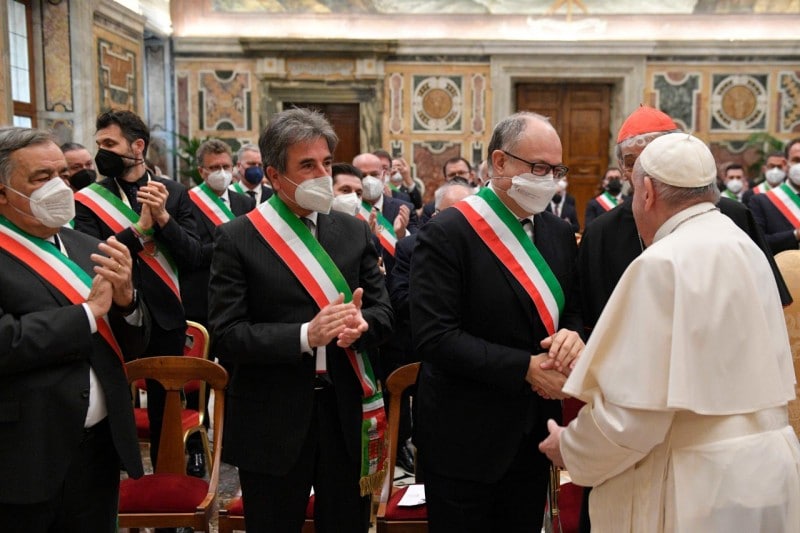
This morning, the Holy Father Francis received in audience, in the Vatican Apostolic Palace, the mayors of the National Association of Italian Municipalities (A.N.C.I.).
The following is the Pope’s address to those in attendance:
Address of the Holy Father
Dear brothers and sisters, good morning and welcome!
I thank the president for his words of greeting. I am glad to welcome you for a moment of reflection on your service for the defense and promotion of the common good in the cities and communities you administer. Through you, I greet the mayors throughout all the national territory, with grateful appreciation, in particular for what you are doing and have done in these two years of the pandemic. Your presence has been instrumental in encouraging people to keep looking forward. You have been a point of reference in enforcing the regulations, at times burdensome but necessary for the health of citizens. Indeed, your voice has also helped those with legislative responsibility in making timely decisions for the good of all. Thank you!
When I think of your work, I realize how complex it is. Moments of consolation are accompanied by many difficulties. On the one hand, in fact, your closeness to the people is a great opportunity to serve citizens, who appreciate you for your presence among them. Your closeness. On the other, I imagine that at times you feel the loneliness of responsibility. Often people think that democracy is reduced merely to delegating by vote, forgetting the principle of participation, essential for a city to be well managed. Mayors are expected to have the solution to all problems! But these problems, as we know, cannot be solved by financial resources alone. How important it is to be able to count on the presence of supportive networks, which provide expertise to deal with them! The pandemic has brought to light so many frailties, but also the generosity of volunteers, neighbors, health workers, and administrators who have gone out of their way to alleviate the suffering and loneliness of the poor and elderly. This network of supportive relationships is a treasure that must be preserved and strengthened.
Looking at your service, I would like to offer you three words of encouragement. Fatherhood – or motherhood, periphery, and peace.
Fatherhood or motherhood. Service to the common good is a lofty form of charity, comparable to that of parents in a family. In a city too, it is necessary to respond to different situations with different forms of attention; therefore, fatherliness – or motherliness – is implemented first and foremost through listening. The mayor or mayoress knows how to listen. Do not be afraid to “waste time” listening to people and their problems! Good listening helps in discernment, to understand the priorities in which to intervene. There is no shortage, thank God, of testimonies from mayors who have devoted much of their time to listening and gathering people’s concerns.
And along with listening, the courage of imagination must not be lacking. Sometimes people are under the illusion that adequate funding is enough to solve problems. It is not true – in reality, we also need a plan for civil coexistence and citizenship: we need to invest in beauty where there is most degradation, in education where social unease reigns, in places of social aggregation where there are violent reactions, in training for legality where corruption prevails. Knowing how to dream of a better city and sharing the dream with other local administrators, with those elected to the city council and with all citizens of goodwill is a marker of social care. And this is in part the task of the mayor or mayoress.
The second word is peripheries. It makes us think of the fact that Jesus was born in a stable in Bethlehem, and died outside the walls of Jerusalem on Calvary. It reminds us of the “centrality” of the peripheries in the Gospels. I like to repeat that you get a better view of everything from the periphery: not from the center, from the peripheries. You are often aware of the tragedy that is experienced in degraded suburbs, where social neglect generates violence and forms of exclusion. Starting from the peripheries does not mean excluding anyone. It is a choice of method; not an ideological choice, but of starting from the poor in order to serve the good of all. You know this very well: there is no city without the poor. I would add that the poor are the wealth of a city. This might seem to some to be cynical: no, it isn’t, they – the poor – remind us of our frailty and that we need each other. They remind us of the need for solidarity, which is a core value of the Church’s social doctrine, particularly developed by Saint John Paul II.
In the time of the pandemic, we have discovered loneliness and conflict in the home, which were hidden; the tragedy of those who have had to close down their businesses, the isolation of the elderly, the depression of adolescents and young people – think of the suicide rate among the young! – the social inequalities that have favored those who were already well off, the hardships of families who cannot make ends meet… And also, if I may mention them, the usurers who come knocking at the door. And this happens in cities, at least here in Rome. How much suffering have you encountered! But the peripheries must not only be helped, they must be transformed into laboratories for a different economy and a different society. Indeed, when we deal with the faces of the people, it is not enough to give them a food parcel. Their dignity demands work, and therefore a project in which each person is valued for what they can offer others. Work is truly the balm of dignity! The surest way to remove the dignity of a person or a people is to remove work. It is not about putting bread on the table: this does not bring dignity. It is about earning the bread you bring home. And this, yes, this anoints you with dignity.
Third word: peace. One of the indications offered by Jesus to the disciples sent on their mission is that of bringing peace to homes: “Whatever house you enter, first say, ‘Peace be to this house!” (Lk 10: 5). There is a need for serenity and peace. And we are certain that the good quality of relationships is the real social security in a city. This is why there is a historic task that involves everyone: to create a common fabric of values that leads to disarming the tensions between cultural and social differences. The very politics in which you are protagonists can be an arena for dialogue between cultures, even before bargaining between different sides. Peace is not the absence of conflict, but the ability to make it evolve towards a new form of encounter and coexistence with the other. “When conflict arises, some simply look at it and move on as if nothing had happened. … Others embrace it in such a way that they become its prisoners. … But there is also a third way, and it is the best way. It is to accept bearing the conflict, resolving it, and turning it into a link in a new process. ‘Blessed are the peacemakers’ (Mt 5.9)” (Apostolic Exhortation Evangelii Gaudium, 227). Conflict is dangerous if it stays closed up in itself. We must not confuse crisis with conflict. For example, the pandemic has thrown us into crisis, and this is good. Crisis is good, because crisis makes you solve problems and take steps forward. But the bad thing is when crisis transforms into conflict, and conflict is closed, conflict is war; in conflict, it is difficult to find a solution to go forward. Crisis yes, conflict no. Flee from conflicts, but live through crisis.
Social peace is the fruit of the ability to pool vocations, skills, and resources. It is essential to encourage people’s initiative and creativity so that they can forge meaningful relationships within their neighborhoods. Many small responsibilities are the prerequisite for a concrete peace that is built up on a daily basis. It is good to recall here the principle of subsidiarity, which values intermediate bodies and does not mortify free personal initiative.
Dear brothers and sisters, I encourage you to remain close to the people, because one temptation, when faced with responsibility, is to run away. To isolate oneself, to flee … isolating oneself is a way of fleeing. Saint John Chrysostom, bishop and father of the Church, thinking precisely of this temptation, exhorted us to spend ourselves for others, rather than stand on the mountains and watch them with indifference. To spend ourselves. This is a lesson to be cherished, especially when we risk being caught up in discouragement and disappointment. I accompany you with my prayer and I bless you, I bless you all: each one of you, in the heart, in your task, I bless your offices as mayors, I bless your collaborators and your work. And may everyone receive this blessing in the measure of their faith. And I ask you, please, to pray for me, because I too am “mayor” of something! Thank you.
Related
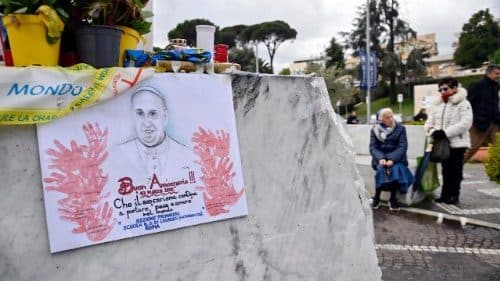
The Pope in Gemelli, condition stable
Exaudi Staff
13 March, 2025
1 min
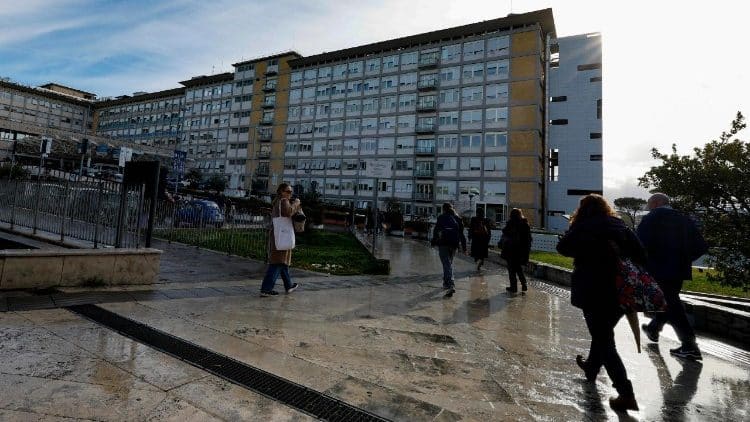
The Pope at Gemelli Hospital: A Peaceful Night
Exaudi Staff
13 March, 2025
2 min
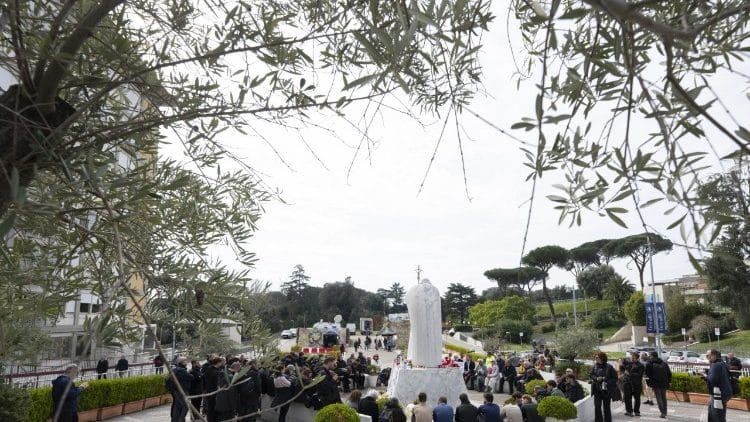
Pope at Gemelli Hospital: Peaceful Night
Exaudi Staff
12 March, 2025
1 min
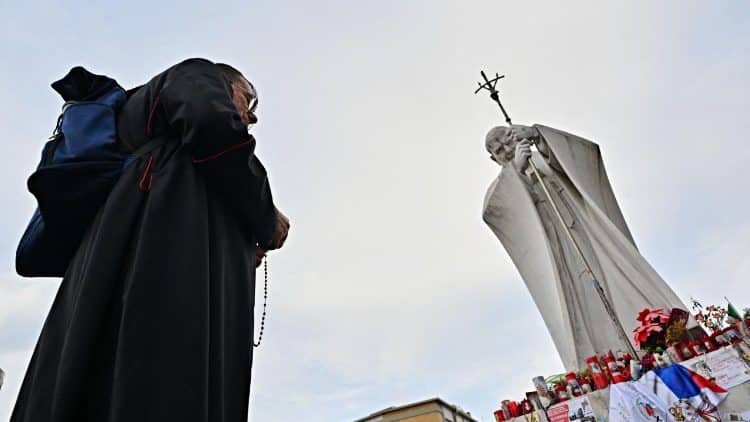
Pope at Gemelli Hospital: Slight Improvement
Exaudi Staff
11 March, 2025
1 min
 (EN)
(EN)
 (ES)
(ES)
 (IT)
(IT)

